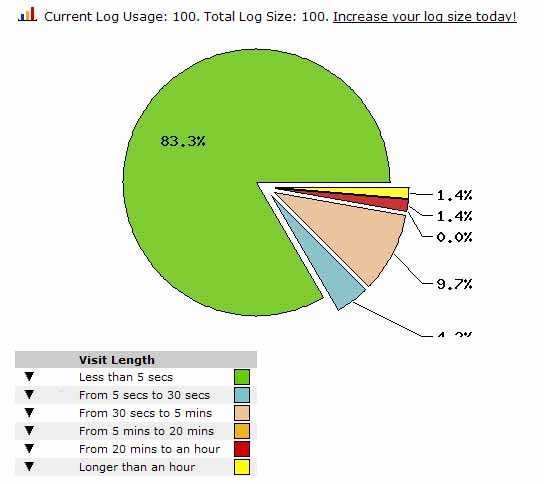
Sample Bounce Rate Chart
For those who are unfamiliar with the term ‘Bounce Rate’, I will give you a brief definition. Bounce rate is “the percentage of your sites visitors who ‘bounce’ away to another site rather than continue on to other pages on your site”. Naturally, this is going to be something that the webmaster should be concerned about, if your web site or blog has a high bounce rate, then this means that although visitors are coming to your site, they are not finding your entire website all that useful. Here are a few tips on how you can decrease your bounce rate…
Content Is King!
We all knew this was going to come first. Without good content, what else do you have apart from a great looking website? Not much. What you need to do is create content that addresses exactly what your visitor is after. Create content that answers all possible questions based on the mindset of someone searching your keyword. This is of course going to be harder in broader keywords, however we will cover a quick tactic in a moment that will address that issue.
Cover All Bases Before Going Broad!
Let’s say for example that you are creating a post on SEO. As the keyword SEO is extremely broad, naturally you are going to want to cover all of your bases first. Think to yourself, ‘am I ready to go this broad?’. By this I mean, if someone searching for SEO information in Google finds their way to your page, what says that they are searching for information on SEO itself. They may be looking for more niche specific information such as article submission, or video optimization, so before hitting that broader keyword, why not generate some more narrow niche content, then go for that larger keyword in a new post, and use internal linking to give that reader any information that they could possibly desire out of that SEO keyword. Of course, some SEO keyword research is going to go a long way here.
Internal Linking Gone Mad!
As stated in the last section, internal linking is great. If you have one post on ‘Accommodation In The High Country’, and several others that are more niche specific such as ‘Bright Accommodation’ and ‘Harrietville Accommodation’, you would be crazy not to internally link those pages on the post for the broader keyword.
My theory on this is quite simple. Broad keywords should be used to cover a collection of information, longer tail and more niche specific keywords should focus on the in depth information itself, the real meat of your content. It is in that method itself that you will earn visitors to your content who will delve deeper into your content, and in turn this will build more authority for your website as a valuable source of information.
Internal linking is not only a great way to increase page views from one visitor, but a great way of increasing site authority. In Google Analytics, one of the worst things that you can see is the percentage of users that bounce from your site to the Google search engines. This should be a clear indication that the content that you are providing is not up to scratch and not internally linked well enough with related content. In the end, it is up to you to create great content (or have it written for you) that will answer questions, that will inspire thought, and that will provide links to deeper content that answers any other questions that your visitor may have.
Recent Melbourne SEO Services Blog Posts:


